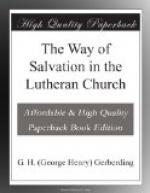If man, thus influenced from above, now deliberately uses his will power, and resists the gracious influences of prevenient Grace, he quenches the Holy Spirit of God, whereby he is sealed to the day of redemption. He has hardened his heart. His last state is worse than the first. He remains unconverted, and on himself alone is the responsibility.
If, on the other hand, he even with the assistance of prevenient Grace, permits it to do its work, the process goes on. His will is being renewed. It experiences the pulsations of a new life. It realizes the possession of new powers. There is an infusion from God’s will into his will, and now prevenient Grace is changed into operating Grace. The Word has free course. It runs and is glorified. He “works out his own salvation with fear and trembling,” while it is all the time “God that worketh in him both to will and to do of His good pleasure.”
Such a person is a new creature in Christ Jesus. Operative Grace goes out into cooeperating Grace. He becomes a worker with God, and as he grows in Grace and in knowledge, his will becomes more and more free as it comes more and more into harmony with God’s will.
Again we ask, What has the human will to do with this great change? We answer, Two things.
First, man can and will to go to church where the means of Grace are, or he can will to remain away. If he deliberately wills to absent himself from where their influence is exerted, he remains unconverted, and on himself is the responsibility. If, on the other hand, he wills to go where God speaks to man in His ordinary way, he does so much towards permitting God to convert him.
Secondly, when the means of Grace do carry renewing power, and he is made to realize their efficacy—though it be at first only in an uneasiness, dissatisfaction with self, and an undefined longing after something better—he can, as we have seen, permit the work to go on. Thus he may be said, negatively, to help towards his conversion. On the other hand, he can shake off the good impressions, tear away from the holy influences, resist the Spirit, and remain unconverted. Clearly, on himself is all the responsibility if he perish. God desired to convert him. He “rejected the counsel of God against himself.” Luke vii. 30.
And thus our Lutheran doctrine of Grace through the means of Grace, clears away all difficulties and avoids all contradictions. It gives God all the glory, and throws on man all the responsibility.
Sailing thus under the colors of scriptural doctrine, we steer clear of the Scylla of Calvinism on the one hand, and also escape the Charybdis of Arminianism on the other.




